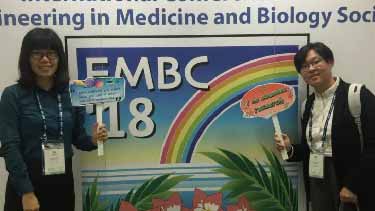WKU faculty and students were invited to present their research paper at the annual conference of the IEEE in medicine and biology engineering

On July 17th., the 40th International Conference of the IEEE engineering in Medicine and Biology was held in Hawaii, USA. The research paper The Inhibition of Acetylcholinesterase by A Brain-Targeting Polylysine-ApoE Peptide: Biochemical and Structural Characterizations led by Dr. Meng Yu and her groups was adopted by the conference. Lu Lu, a WKU graduate of B.S. Computer Science, gave an oral presentation about the topic on the conference.
IEEE EMBC is the largest biomedical engineering society in the world, with more than 11,000 members. Covering about 97 countries and regions around the world, IEEE EMBC is the fastest growing conference in the world and the international academic conference with the highest rate of elimination in the field. It covers cutting-edge research and innovation topics such as biomedical engineering, health care technology research and development, clinical transformation, technology transfer and entrepreneurship, and biomedical engineering education. It represents the most advanced research level and progress in biomedical engineering. A number of scholars and scientists around the world attend the conference every year.
The research paper was completed by Dr. Meng Yu, Dr. Michelena Toby, Dr. Wong Aloysius, Dr. Zhang Changjiang and Lu Lu.
Dr. Meng Yu started her research “Mechanism of a novel and efficient in-trans drug carrier K16ApoE across the blood-brain barrier” in 2016 and received the fund support from National Natural Science Foundation of China.
This project states the enzyme replacement therapy (ERT) which has been proved to be the most effective way for lysosomal storage disorder (LSD) treatment. However, the blood-brain barrier (BBB) presents a major challenge to deliver therapeutics in central nervous system (CNS), which limits the application of ERT in CNS-involved LSD. Current strategies to cross BBB mainly focus on increasing the concentration of blood-circulating drug or constructing the drug-carrier chimera which targets the receptors on BBB. Although methods do exist to help recombinant lysosomal proteins cross the BBB in animal models results have been modest in terms of low levels achievable in the brain and therapeutic value in terms of increasing the lifespan of animal models remains to be demonstrated in a convincing way. An efficacy study on a novel in-trans peptide carrier (K16ApoE) in late-infantile neuronal ceroid lipofuscinosis (LINCL) mouse model was found recently, and results demonstrated that supraphysiological levels of TPP1 were achieved in the brain after co-injection of TPP1 and K16ApoE mixture. Importantly, peptide-mediated delivery of TPP1 from the bloodstream into the brain translates into significantly increased lifespan. However, the mechanism of action of K16ApoE is yet to be definitively elucidated which greatly limits its clinical translational potential. Here, the team proposes the study to dissect the mechanism of K16ApoE mediated drug delivery across BBB. Specifically, the team explores the pharmacokinetics mechanism of K16ApoE, the route, and distribution of K16ApoE from blood to brain, the specificity of the therapeutics delivered by K16ApoE and the interaction between K16ApoE and BBB.
The research has realized the interdisciplinary application of biology and computer science, which is of great importance to the development of disciplines in WKU.
As the only student participant, Lu Lu from Computer Science joined the research team in 2017, and brought great contribution to the team with her professional knowledge. Using software to simulate the relationship between peptides and proteins, she conducted related research about the biochemical characteristics of K16ApoE, and strengthened the team’s understanding of the mechanism of action of the peptide.
Lu Lu said that through the research of this project, she has truly applied the computer knowledge she has learned to the field of biology, which helped her further clarify the postgraduate preference. This fall, she will travel to the University of Michigan, Ann Arbor, to pursue a major in bioinformatics, and continue to apply the computer technology to explore those unknown biological issues.